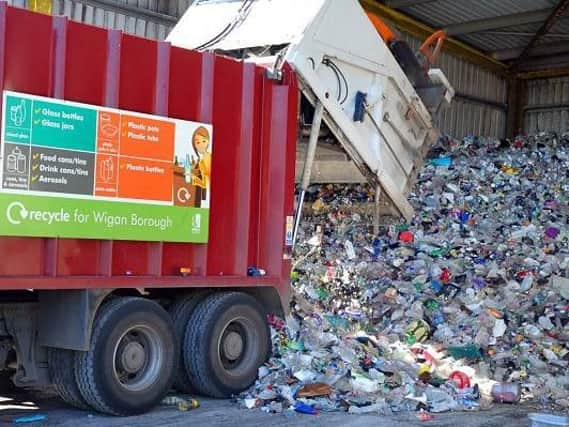Fewer bin collections sees rise in recycling in Wigan


New figures show recycling levels across the borough hit 53 per cent in 2018/19.
That was an improvement on 48.5 per cent from the year before and means the local authority has surpassed the national target of 50 per cent by 2020.
Advertisement
Hide AdAdvertisement
Hide AdWigan Council has been working to improve recycling rates as part of The Deal, as it not only protects the environment but saves the cash-strapped authority around £2m a year.
Since 2015/16, the borough’s recycling figures have consistently improved and are now almost 10 per cent better than three years ago.
Some of this success has been attributed to the decision to change the bin collection frequency in 2017.
Other authorities also cut the number of collections of non-recyclable waste, but the move was unpopular in Wigan at the time.
Advertisement
Hide AdAdvertisement
Hide AdIt was not supported by the results of a public consultation and residents feared the impact that fewer collections of waste would have.
Coun Carl Sweeney, the council’s cabinet member for environment, said: “The council introduced three-weekly bin collections in 2017 to increase recycling which helps reduce the amount of waste going into landfill which is good for our environment.
“As a result of residents doing their bit, we have surpassed this target. I would like to thank local people for their continued support with recycling and for doing what they can to help our environment.
“Recycling more and recycling right helps us to keep council tax low and invest money in frontline services.”
Advertisement
Hide AdAdvertisement
Hide AdWigan was named as the top plastic recycling town in the UK last month after a survey by cosmetics firm The Body Shop.
The borough sent 9,000 tons of plastic for recycling between 2017 and 2018.
It is also among a minority of councils still collecting garden waste for free.
Earlier this month, the council announced its ambitions to be litter-free by 2030 and detailed proposals for a litter strategy aimed at making the borough cleaner, greener and more sustainable.
Advertisement
Hide AdAdvertisement
Hide AdCoun Sweeney said: “Every pound of taxpayers’ money spent clearing up after people who drop rubbish on our streets or green spaces is a pound that could have been invested in our schools, enhancing our open spaces or caring for people in need.
“We want to change the culture towards litter. Too often we have to be reactive when it comes to waste removal, this strategy aims to change this and focus more on preventative action to help reduce litter and fly-tipping happening in the future.”
The development of a litter strategy follows the Deal 2030 Big Listening Project where residents said how important cleaner streets and open spaces were.
Developed by residents, community organisations, businesses and public bodies, The Deal 2030 outlines how everyone can work together to create a world-class place to live, work and visit over the next decade.
More than 6,000 people responded and 10 goals were set for the borough, with litter enforcement and prevention among them.